Column by Mahfuz Anam: Are we going to learn from our mistakes or keep repeating them?
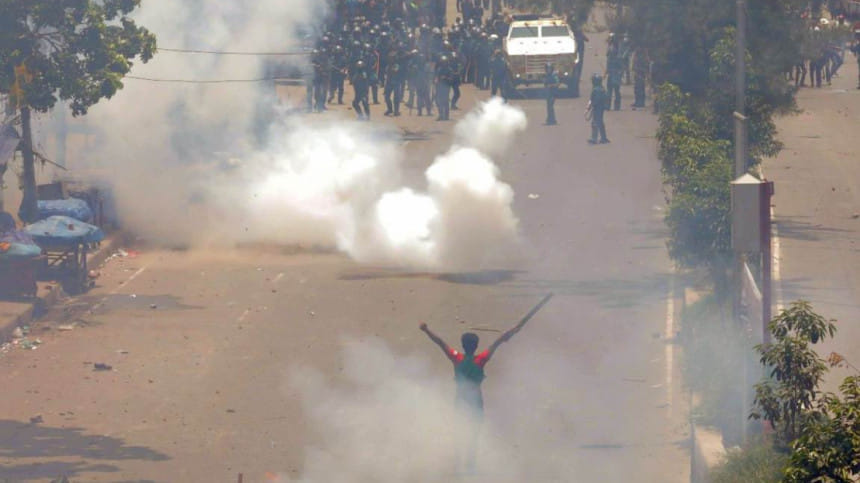
At the outset, we want to express our unambiguous condemnation of the mayhem created by ideologically and politically motivated groups whose aim was to destabilise our country, use the general discontent to instigate violence, and try to "topple the government"—as claimed by some ministers and which, if true, we vigorously denounce. This has made us realise that our country faces internal enemies opposed to our development and overall success. The destruction of public property and the setting of fire to essential government offices, transport facilities and part of internet infrastructure that greatly crippled trade, manufacturing and the daily life of citizens need to be highly condemned, and the perpetrators exposed and punished within the law. We in the media will assist the government in unearthing this move against Bangladesh. Those who opposed our birth in 1971 must be resisted, defeated and destroyed.
However, there is something else that concerns us. What we are witnessing right now is a classic struggle to control the narrative. The battle is on to direct the "truth" with all the state machinery at play to establish it. The regime beneficiaries are joining the parade to justify the charade. George Orwell, welcome to Bangladesh. Sorry you have been here many times before.
Slowly but surely, the story of the student movement for quota reform is fading from the official narrative and that of the BNP-Jamaat conspiracy to destabilise the country is gaining currency. In our view, both stories merit coverage and in-depth analyses. Why one is fading and the other is becoming bigger is because one suits those in power and the other embarrasses them. The blame game is on; demonising the other is in full swing. According to the new narrative, the students were mere "pawns" from the start and the whole episode was a part of an elaborate plan to destroy the economy and even "topple the government."
We are back to our old habit of never analysing events that shake us all and learn from our mistakes. How can we not immediately investigate how more than 150 people could be killed within a few days? We will perhaps never ask how the peaceful student movement went out of hand; why the government did not take steps in time to resolve the crisis; what triggered the students' anger; if there were any mistakes in handling the situation; why there were so many deaths; if the police made any attempt to control the crowd; if they had to shoot students when they did and if the shooting had to be so brutal; if bringing the "Razakar" issue was at all relevant; if anyone asked the students not to give that anti-liberation slogan (which they stopped the moment they realised their mistake); why with the deployment of BGB the death toll shoot up; if the BGB were given wrong instructions or if they turned out to be "trigger happy." On the political front, couldn't the Awami League—a party with such a long history and experience—have reached out to the students, instead of unleashing the Chhatra League to "take care of them"? Was the call to shoot at sight necessary, and did the police firing not inflame the situation further? Why were helicopters used to fire upon demonstrators? There are many more such questions that must be asked and answered through impartial investigation. Otherwise, we will never learn from our mistakes and keep on repeating them.

So much blood, such mindless brutality, such indiscriminate beating of students demanding quota reform, such twisting of narratives and dangerous and fallacious tagging of general students as "Razakars," attacking students in hospitals when they were receiving urgent medical assistance, such reckless shooting of demonstrators, and the ongoing indiscriminate arrest have created such ill feelings and deep suspicion that to expect an outright acceptance of the government's offer is unrealistic. Students' trust must be regained. A difficult task, but it must be attempted with sincerity and earnestness.
Simply put, there are two distinct phases of the story of the student movement for quota reform that we have been seeing till date. The first phase started on June 5, when the High Court set aside the government decision to abolish the quota system completely through a government circular, and lasted till July 15. The second phase started on July 15, when the BCL started violently attacking the demonstrating students that triggered violence, which spread throughout the country resulting in large-scale killings by the law enforcement agencies.
What distinguishes the two phases is violence: there was none in the first and tragically plenty in the second. The first was totally peaceful and in the hands of the students, and the second highly violent with political elements having entered the movement, especially members of Jamaat and Shibir (the student front of Jamaat) as emerging evidence indicates.
The government's attempt to totally ignore the first phase and put all its focus on the second is, we think, not reflective of what is uppermost in the public mind and, as such, not the most judicious of decisions. While attempt to unearth the deep conspiracy in the second phase must continue with utmost vigour—which we in the media will support and promote as long as it is evidence-based—ignoring the mistakes made in the first phase and not investigating how such a large number of deaths, injuries and physical assault on students occurred and not punishing those responsible will be a blunder of enormous proportions.
When the movement started, it was only about quota reform. By the time it ended, many issues became added due to the government's incompetent and harsh handling of the situation. When there was not a single death, not a single instance of violence, when thousands of students were holding peaceful demonstrations on their respective campuses throughout the country, when students were inviting quota reform talks—that was the time when any government would have reached out to the demonstrating students. Ours did not.
Instead, we saw more than 150 deaths, including that of demonstrating students, BCL cadres, police and the general public,in less than a week—highest ever in the history of independent Bangladesh—more than 3,000 injured (both highly conservative figures), and widespread beating of students and demonstrators under one guise or another. The government and the ruling party should not underestimate the depth of this feeling of the students of having been seriously wronged.
Our reporters and photographers met so many parents, relatives and guardians who have lost their dear ones. Their stories bring out the deepest sense of anguish and disgust at the needlessness of it all. So many of the students have such vivid memories of friends and fellow demonstrators being killed or severely beaten up and injured by BCL and law enforcement members; that emotional and psychological wound cannot be expected to be healed overnight. That healing will occur only if the subsequent attitude of the authorities is one of genuine understanding, concern and care backed by a credible commitment of total exoneration of the students from legal harassment. This needs to be so because many quota demonstrators of 2018 had to face police investigation, court appearances and bail formalities for years, at significant legal expenses that many could not afford. Students know it and remember it, and fear its repetition.

That anti-state elements riding on the shoulder of only a two-week-old student movement can destabilise us raises concerns as to how this could happen under a government that has been in continuous and unquestioned authority for the last 15-plus years. That a pro-liberation government, enjoying supreme power for a decade and a half, suddenly finds that anti-liberation forces have become such a threat that it needs the army to save itself—police, Rab and BGB having all failed—worries us immeasurably and raises the question as to whether the ruling party and the government need to revisit their policies and actions of the last 15-plus years, whether or not its own high-, mid- and lower-level leaders have served the party well, and whether cronyism and corruption inside the party needs a thorough looking into.
This period needs to be assessed as much for the sake of the people as for the ruling party itself. In our view, it was during this period that the greatest party in the history of Pakistan and Bangladesh combined, and the one that lay at the heart of all democratic movements here, lost its way and became a money-making machine whose stature at the grassroots level is a pale shadow of its glorious past; whose leaders frankly admit that their survival is guaranteed only by muscle power and no moral power of ethics, honesty, patriotism, and values of our freedom struggle.
It was during the same period that saw greatest harm being done to the most pivotal institution of democracy: free and fair elections. The last three elections—2014, 2018, and 2024 (the last one was a bit more competitive as AL dissenters were allowed to participate)—were mere rituals where voters were the least important elements, far outweighed by police, bureaucracy and money, and muscle power of the ruling party cadres. The "shooting in the foot" policy of BNP to boycott elections made election manipulation easier by the rulers.
The obvious result of controlled elections was a controlled parliament that never saw any lively debate on any of the vital challenges that the country faces.
As power consolidated and elections became largely predictable, the bureaucracy, police, intelligence community and all other state institutions—in fact, everyone holding government jobs—knew which side of the bread was buttered and acted accordingly. Favouritism and cronyism in business led to Bangladesh's corruption index hitting the roof and the rich-poor gap widening as never before. We saw the gradual but alarming erosion of accountability of state institutions, transparency of administrative processes, and politicisation of institutions of the state that crippled good governance.

None of the above crucial questions will be asked and the business-as-usual attitude of the "enemy" doing it all will dominate our thoughts and narrative. The only way the situation will be handled will be more arrests of the same clang and repetition of what we have heard over the years.
At this crucial moment, we must understand that "what got us here will not take us there" (borrowing from the title of Marshall Goldsmith's book), meaning to the higher level of development. We must change the way we think, act, and engage with people, especially with the younger generation. They are smarter, more knowledgeable, more tech-savvy, and far more confident than we ever were. They are citizens of the 21st century and will live and compete in the world of artificial intelligence. Our prime minister wants to build a "Smart Bangladesh." We all support her in that effort. But is killing, torturing, injuring, threatening and making students live in fear any way of making them proud participants of that "Smart Bangladesh"? We must be among the biggest fools in the world to think that we can beat them, torture them and frighten them into submission. We have to win their hearts and minds and not bang their heads. The way we have handled the student protesters of the quota reform movement will greatly exacerbate brain drain. The AI world will make a global village of talents and no oppressive measure can hold them back.
Focusing on the narrative of "conspiracy" and ignoring the one that involves students and the many lives lost may give some respite, but it is no way of creating confidence among the students about our future here. We really need to change our mindset. Otherwise, we will keep on repeating our mistakes. And given the fast-moving and competitive world, we are not likely to get too many chances.
Mahfuz Anam is the editor and publisher of The Daily Star.
Follow The Daily Star Opinion on Facebook for the latest opinions, commentaries and analyses by experts and professionals. To contribute your article or letter to The Daily Star Opinion, see our guidelines for submission.

 For all latest news, follow The Daily Star's Google News channel.
For all latest news, follow The Daily Star's Google News channel. 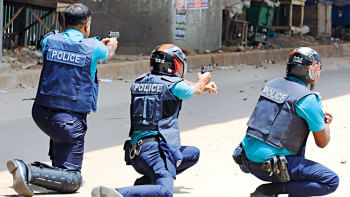
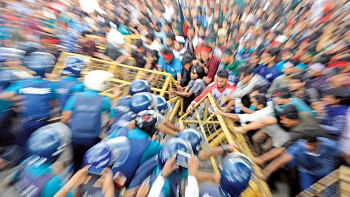
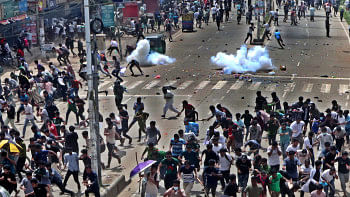
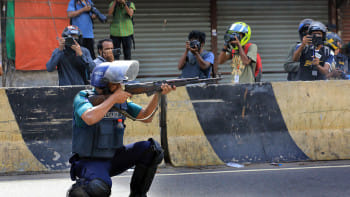
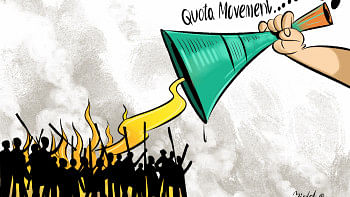




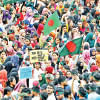




Comments